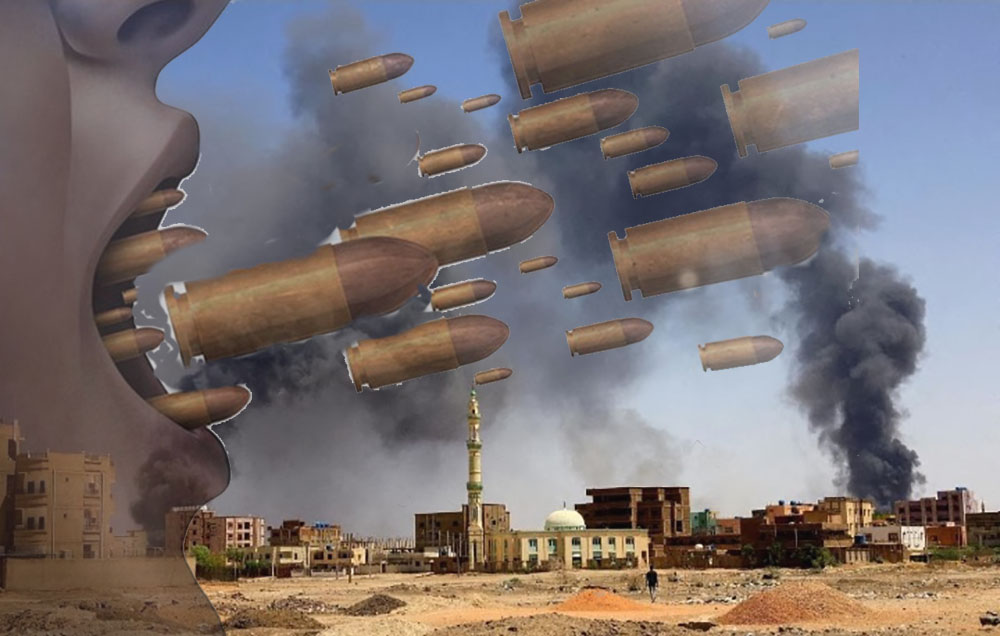
Media de-escalation in the Sudan War... Between disengagement issue and romance
Maryiam Abbasher
The Jeddah 2 tour, which ended in the middle of last week, was fused by observers with failure because it had failed to reach its path, committing the parties to a ceasefire, paving the way for the delivery of humanitarian assistance through safe corridors for those affected. However, the Round also concluded a number of items relating to confidence-building between the fighting parties, the most important of which was action against the escalating and conflict-fuelling parties, to be implemented in parallel.
These commitments, although considered scant in view of the expectations made on the tour following a three-month hiatus, represent an important step to stop media leafleting. Incitement, escalation and media hustings have contributed to sparking the Sudans war. Many of the speeches on the podium, which preceded the outbreak of the war, caused the parties to enter the podium, even though it was described as absurdity and the victor was a loser. It is a war that all expectations suggest that it will dismantle the Sudan into Doelat if reasonable people do not rectify this crisis, and they seek to bring the parties to settle the dispute through negotiation after it is proven that military resolution will not lead to a solution.
The statement of the second round of his grandfathers platform also highlighted the importance of facilitating the delivery of humanitarian assistance, which contributes to alleviating the suffering of the Sudanese people and the situation of distress in which they live, especially in areas still under bombardment. The call for a halt to media escalation, a reduction in hate speech and the fuelling of the flames of war is also an important entry point for creating a suitable ground for the success of the upcoming rounds, fostering trust between the parties, and renouncing the language of exaltation and extremism, which was one of the main causes of the war. However, observers viewed the inclusion in the results of the last round of a reference to action on the elements fuelling the conflict as an attempt to emphasize that the round had achieved advanced results at a time when it had failed to meet the most important demands of stopping the fighting.
Disengagement Issue
Dr. Khaled Al-Tajani, an academic and media associate, believes that raising and seizing the media file is not worth commenting on. In his view, the tour failed to control the war itself by declaring a truce. He added that the media reflected the situation in this war, considering the inclusion in the statement of the conclusion of the Round of Information of an issue or an attempt to give the impression that there has been progress in so-called confidence-building measures.
It adds that the parties are not prepared to agree on a truce, let alone a ceasefire. The media did not work out of thin air, but reflected the situation. He considered it meaningless as there was no mechanism or criteria for controlling media discourse, stressing that such a war was not in compliance with international law. He cautioned that the Jeddah Agreement signed on May 11 was based on two issues: first, responding to humanitarian demands and protecting civilians based on international human rights laws and international humanitarian law that define and govern any war operation. He pointed out that the war in the Sudan, especially by rapid support, did not abide by laws and rules, nor did it abide by the Jeddah Agreement. second; The distinction between civilian and military objectives and the distinction between civilians and combatants is, in Dr.
Rapid support had shifted from targeting the army to targeting and violating citizens rights. The forces committed crimes for which international convictions were issued. In his view, Jeddahs platform had failed even to comply with the rules of international law and human rights law with regard to the war itself, where all such violations had been committed. At the same time, the media is asked to shut up. "Even the agreement to open humanitarian corridors linked to the ceasefire", he added.
He emphasized that war should be based on specific and well-known rules, so that media discourse would be acceptable, and that was what the war lacked.
Romantic
Calling on the parties to the conflict to work to build confidence and take action against the perpetrators of the conflict has also not been accepted by Professor and media expert Abdullah Rizk, who called the request romantic.
He said that the idea of "building trust during mutual bombardment" was not without blink, romantic, but amounted to magical realism. In his view, the failure to achieve a ceasefire, in this round of negotiation, means -- at least -- that there are still those who believe in the possibility of military resolution, which must be reminded, once again, that "there is no acceptable military solution to this conflict", as stated by the facilitators.
He continued: "The agreement may seem like a good first step, a small but important, positive step towards ending the war, but it is less than the aspirations of the citizens, who are broken by the flames of war, the suffering of displacement and forced displacement.
Rizk noted that the Jeddah negotiating facilitators team did not pay much attention to stopping the fate and implementation of the commitments arranged by the May 11 Agreement, particularly with regard to the protection of civilians, the opening of safe corridors, and their implementation, before overburdening them with further commitments with no clear assurances about their implementation.

